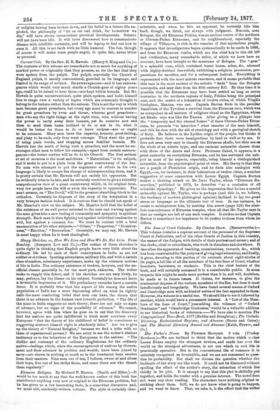Current Coin. By the Rev. H. R. Haweis. (Henry S.
King and Co.)— The contents of this volume are remarkable not so much for anything of marked power or originality that they possess, as for the fact that they were spoken from the pulpit. The pulpit, especially the Church of England pulpit, is mostly conventional, guarded in its language, and limited in its range of subject. Its extravagances—and it has extrava- gances which would very much startle a Church-goer of eighty years ago, could he be raised to hoar thom—are kept within bounds. But Mr. Haweis is quite unconventional, quite plain-spoken, and holds himself free to range over a variety of topics which are commonly thought to belong to the lecture rather than the sermon. This is not the way in which men become great preachers, but every age must be content to number its great preachers by twos and threes, whereas good preachers— men who say the right things at the right time, who, without having the power to carry away their hearers, yet do contrive now and then to send them home inclined to do or not to do, what it would be better for them to do or leave undone—are or ought to be common. Many men have the capacity, honesty, good-feeling, and piety to be such, only they want courage. They want the power of using plain words, and stepping across familiar bounds. Mr. Haweis has the merit of being such a preacher, and the more he en- courages other men to follow his example,—apart from certain extrava- gances—the better service will he do to his Church. The first sermon or set of sermons is the most ambitions. " Materialism " is its subject, and it seeks to put in a plain form the great controversy of the day. No man who attempts to put the arguments of others in his own language is likely to escape the charge of misrepresenting them, and it is pretty certain that Mr. Haweis will not satisfy his opponents. But he evidently tries to be fair, and he certainly contrives to give a tolerably comprehensive view of a great controversy which, in its original form, very few people have the will or even the capacity to appreciate. The next sermon, on "The Devil," will be the greatest stumbling-block to the orthodox. Certainly he disposes of the story of the temptation in a very brusque fashion indeed. It is curious that he should not speak of Mr. Manrice's view on the subject. Mr. Maurice held that the belief of the existence of an evil power external to the man and warring against the man gives him a new feelingof community and sympathy in spiritual strength. Each man is then fighting not against individual tendencies to evil, but against a common foe. We must be content with a brief enumeration of his other subjects,—" Crime," "Pauperism," "Drunken- ness," ,‘ Emotion," "Recreation." Generally, we may say, Mr. Haweis is most happy when he is least theological.


































 Previous page
Previous page